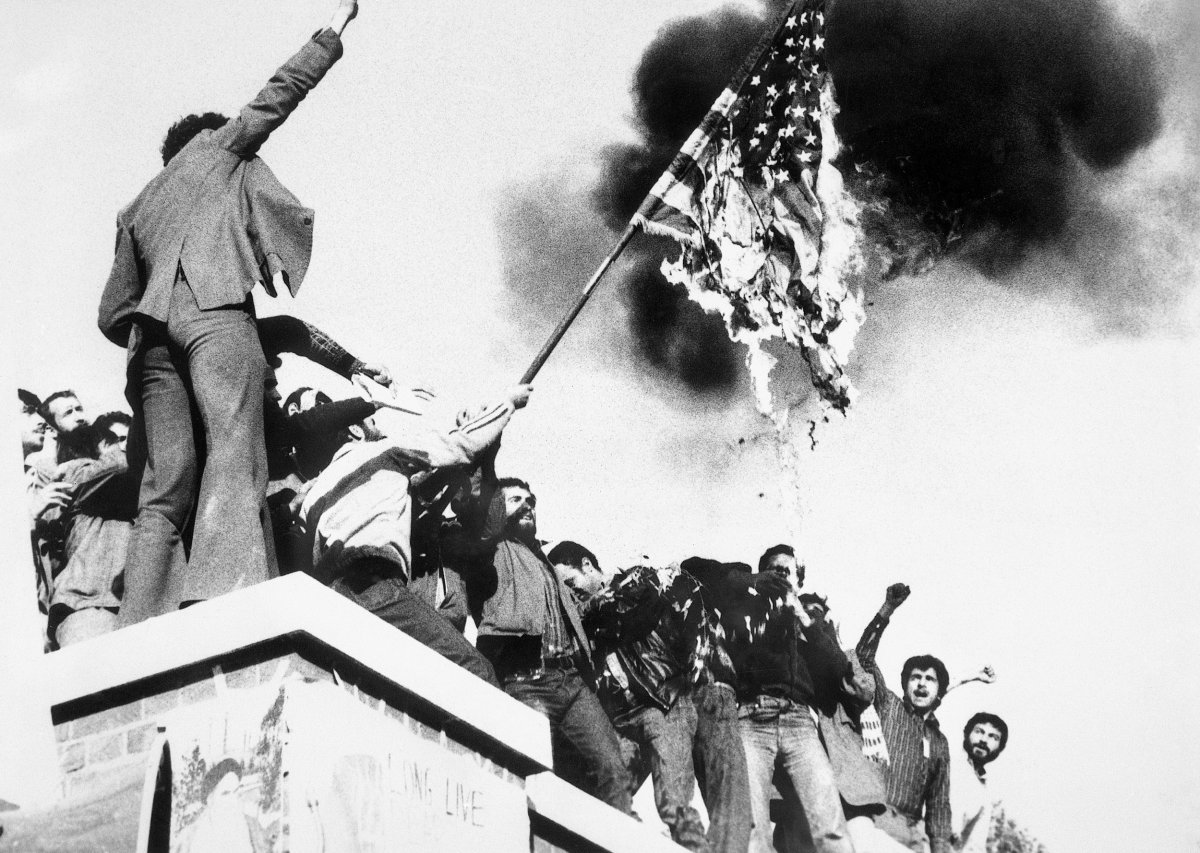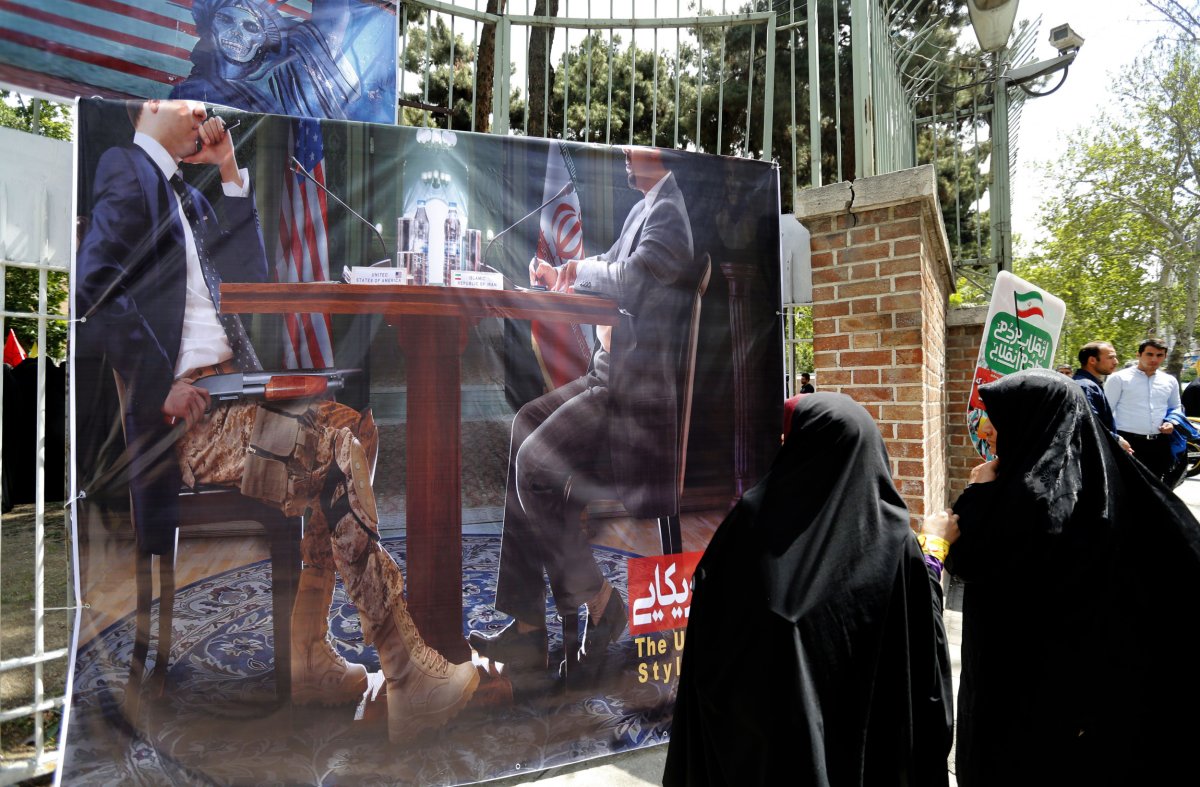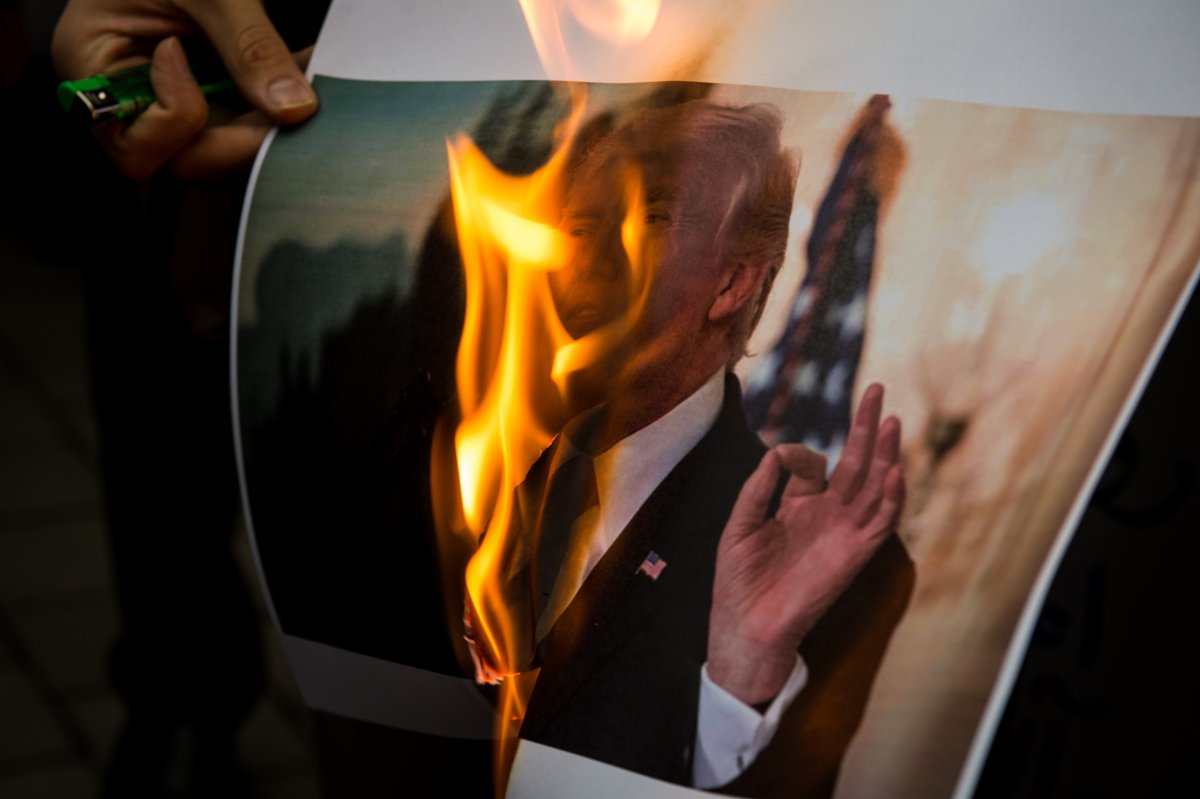State-organized rallies were held in Iran on Monday to mark the 40th anniversary of the storming of the U.S. embassy in Tehran, when activists—flushed with revolutionary zeal—sought to drive American influence out of the reborn country.
The next day, Supreme Leader Ayatollah Ruhollah Khomeini declared America "the Great Satan, the wounded snake." The revolution—with "Death to America" among its most prominent slogans—overthrew the widely disliked Shah Mohammad Reza Pahlavi, himself installed in a Western-sponsored coup in 1953.
The embassy building in Tehran remains, though the wall surrounding it is now covered in anti-American graffiti and murals. The building itself now houses a museum called the U.S. Den of Espionage.
The former diplomatic mission stands as a symbol to the antipathy and mistrust that has tainted U.S.-Iranian relations since the revolution. And despite some bright moments, the relationship remains bogged in hostility.
The past 40 years have been punctuated with flash points. The hostage crisis immediately soured relations between the Islamic Republic and the U.S. The standoff eventually stretched to 444 days, during which American forces attempted a disastrous rescue operation that left eight U.S. soldiers dead.
American support for Iraqi President Saddam Hussein during his country's long and bloody war with Iran underscored Washington's disdain for the new regime in Tehran.

The 1980s also saw Iranian-funded attacks on U.S. in Lebanon and Saudi Arabia which killed hundreds of Americans, plus the downing of an Iranian passenger jet by a U.S. cruiser amid the "tanker war" period of the Iran-Iraq conflict, in which American forces clashed repeatedly with the Iranians.
The new century brought no respite. The 9/11 attacks sucked America deeper in the Middle East, and President George W. Bush's inclusion of Iran in his so-called "Axis of Evil" raised fears that the country might be next on his list of military actions.
As American forces sank into the quagmire of the Iraqi occupation, Tehran was more than happy to train, fund and arm militias that killed U.S. soldiers across the border.
Despite decades of enmity, President Barack Obama's two terms delivered one of the few bright sparks in the history of U.S.-Islamic Republic relations.
In 2015, the two nations signed the Joint Comprehensive Plan of Action, which introduced restrictions on Iran's nuclear program in exchange for relief from crippling international sanctions.
Pushing Iran away
But hopes of a fresh era of cooperation were to prove naive. A backlash from conservatives in both nations—plus skeptical regional U.S. allies—hampered the deal, and the economic benefits of sanctions relief were slow to trickle through to the Iranian people.
As Dalia Dassa Kaye, a senior political scientist at the RAND Corporation, explained, the trajectory of the deal followed a pattern of "limited" successes and ultimate failure to realize "normalized bilateral relations" between the two nations.

The election of President Donald Trump served as the coup de grâce for the JCPOA, despite efforts by the other signatories to keep the accord alive. Virulently anti-Obama, anti-multilateralism and anti-Iran, Trump never hid his disdain for the agreement, and withdrew the U.S. from it in May 2018.
The other signatories have maintained their support for the agreement, though they were limited in their ability to soften the blow of subsequent U.S. sanctions. Furious, the Iranian regime has taken steps to spool up its nuclear capacity in violation of the JCPOA's terms, giving the Trump administration yet more reasons to refuse to return to compliance.
It remains unclear exactly what Trump is after. Kaye pointed to the "mixed messages coming from the president and his top advisers," obfuscating whether the administration desires policy reorientation or full regime change in Tehran.
Ellie Geranmayeh, a senior policy fellow at the European Council on Foreign Relations told Newsweek Trump represents "a major setback to any sort of rapprochement or detente between Tehran and Washington."
Trump regularly says he wants to reach a new deal with Tehran, but Geranmayeh noted that his "actions and his behavior have pushed Iran further away."
The situation has also been a boon to Iran's hardliners, many of whom never trusted that Washington would deliver on its promises. Back in 2015, the moderates won out. But four years later Iran has little to show for its efforts and—by most accounts—compliance with the JCPOA.
"That camp within the leadership that had been pushing for at least a transactional relationship with the United States, has been really cornered and marginalized because they've had their fingers burned," Geranmayeh explained.
The Trump administration is the materialization of Iranian anti-American propaganda. The regime's ever-present need for an external enemy is thus "being validated" by the White House, bolstering Tehran's theocratic state which in recent years has shown significant cracks in unified facade.
The slow death of the JCPOA has ratcheted up tensions in the Middle East. Tankers have been bombed, U.S. and allied facilities targeted and an American drone shot down.

The U.S. was reportedly on the verge of airstrikes on Iranian military positions, but Trump called the aircraft back at the last moment.
Such instability is evidence of a failed White House strategy, Kaye argued.
"The growing economic pressure on Iran—with no apparent off-ramp—has not led to a 'better' deal and has not led to regime change," she explained. "What it has led to is more dangerous Iranian activity in the region targeting oil supplies and regional partners."
"To make matters worse, Iran has begun to walk back from its commitments in the nuclear deal, crossing limits on enrichment activity and centrifuge development," Kaye continued. "It's hard to see how any of these developments are a win for U.S. interests or regional stability."
Generational damage
Much has been made of Iran's young, liberal, well-educated, urban population. Many observers and politicians hoped this strata would take the reigns as the country's revolutionary generation died away, and serve as an ointment to testy relations with the West.
But the JCPOA fiasco might yet taint this theorized progression, giving anti-America sentiment a shot in the arm, driven more by nationalism that religious fervor.
Geranmayeh suggested Trump's policies could have "almost a generational impact on the psyche of not just the Iranian leadership, but also the population at large," Geranmayeh suggested.
"My sense is that the withdrawal from the nuclear deal will be another kind of watershed moment in the relationship," she added. "Even 10 years, 20 years down the line, you're probably going to get Iranian policymakers pointing out the fact that the U.S. cannot really be trusted because of this historic example of what Trump did to the agreement."
If Trump does indeed want a new nuclear deal, time is running out. The 2020 race is already dominating U.S. headlines, and Trump is becoming ever-more consumed by the Democratic impeachment investigation. Meanwhile, Iran is refusing to consider new talks.
The White House's lack of success with other negotiations—e.g. with China and North Korea—suggest a breakthrough with Iran is unlikely to suddenly materialize. Tehran, like other nations, could well wait out the administration to see who will be commander in chief in January 2021.
But even if it is a Democrat keen on re-engagement, success is far from guaranteed. A new president will not have long to sit down with Tehran before Iran's presidential election process kicks off, putting the breaks on any discussions and reshuffling any negotiating team.
Any new Democratic president would also have to grapple with a bitter Republican Party vehemently opposed to any diplomacy with Iran. The 2020 election is tipped to be one of the dirtiest and polarizing in U.S. history—bipartisan relations could be in tatters by the start of the next administration, regardless of who is in the Oval Office.
There will be no quick fix. The JCPOA process began in 2000, requiring multiple administrations and failed rounds of negotiations to achieve success. Obama and Iranian President Hassan Rouhani got a deal over the line, but Geranmayeh warned "it might actually take years before that alignment is seen again."
Kaye concurred, concluding that "given the breakdown of trust and the already deeply rooted animosity on both sides, we should not expect a breakthrough in U.S.-Iranian relations anytime soon."
Uncommon Knowledge
Newsweek is committed to challenging conventional wisdom and finding connections in the search for common ground.
Newsweek is committed to challenging conventional wisdom and finding connections in the search for common ground.
About the writer
David Brennan is Newsweek's Diplomatic Correspondent covering world politics and conflicts from London with a focus on NATO, the European ... Read more
To read how Newsweek uses AI as a newsroom tool, Click here.








